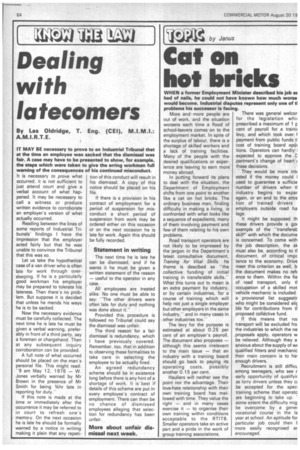cat on hot bricks
Page 66

If you've noticed an error in this article please click here to report it so we can fix it.
WHEN a former Employment Minister described his job as bed of nails, he could not have known how much worse would become. Industrial disputes represent only one of tl problems his successor is facing.
More and more people are out of work, and the situation worsens each time a flood of school-leavers comes on to the employment market. In spite of the surplus of labour, there is a shortage of skilled workers and a lack of training facilities. Many of the people with the ,desired qualifications or experience are leaving to earn more money abroad.
In putting forward its plans to deal with the situation, the Department of Employment shifts from one point to another like a cat on hot bricks. The ordinary business man, finding difficulty in making a living, is confronted with what looks like a sequence of expedients, many of them involving payment and few of them relating to his own problems.
Road transport operators are not likely to be impressed by the jargon in the Department's latest consultative document, Training for Vital Skills. Its theme is descibed as "the collective funding of initial training in transferable skills." What this turns out to mean is an extra payment by industry, or by certain industries, for a course of training which will help not just a single employer but other employers in the same industry," and in many cases in other industries too."
The levy for the purpose is estimated at about 0.25 per cent of an employer's payroll. The document also proposes — although this seems irrelevant to the main issue — that an industry with a training board should go back to paying its operating costs, possibly another 0.15 per cent.
Hauliers will neither see the point nor the advantage. Their love-hate relationship with their own training board has mellowed with time. They value the right — and in many cases exercise it — to organise their own training within conditions acceptable to the RTITB. Smaller operators take an active part and a pride in the work of group training associations. There was general welcor for the legislation whil prescribed a maximum of 1 p cent of payroll for a trainii levy, and which took over f payment from public funds ti cost of training board oper tions. Operators can hardly • I expected to approve the C partment's change of heart 's these decisions.
They would be more int( ested if the money could I used to guarantee a sufficie number of drivers when tl industry begins to expar again, or an end to the attra tion of trained drivers employers outside road ha lage.
It might be supposed th these drivers provide a go( example of the "transferab skills' with which the docume is concerned. To come with the job description, the sk must also be, according to tl document, of critical innpc tance to the economy. Drive meet this criterion as well, b the document makes no refE ence to them. Within the fie of road transport, only tl occupation of a skilled mot vehicle mechanic is included a provisional list suggestir who might be considered eliE ble for contributions from th proposed collective fund.
If this means that roz transport will be excluded fro the industries to which the ne proposals apply, operators w be relieved. Although they a anxious about the supply of wE qualified fitters and mechanic their main concern is to ha, enough drivers.
Recruitment is still diffici, among teenagers, who see r early opportunity of qualifyir as lorry drivers unless they c( be accepted for the speci training scheme that operate are beginning to take up. some extent the difficulty mig be overcome by a gener vocational course in the la year at school. An aptitude for particular job could then I more easily recognised ar encouraged.




































































































